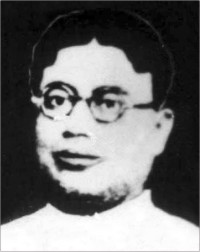| Behind the Scene
From Sunamganj
Remembering Mokbul Hossain Chowdhury
Iqbal Siddiquee
 Mokbul Hossain Chowdhury was a big name in the field of journalism in the Assam-Bengal region. A man of diverse interests, Mokbul is still remembered for contributions as a journalist, social worker, orator and writer as well as politician. Half a century after his death, he is still remembered. Mokbul Hossain Chowdhury was a big name in the field of journalism in the Assam-Bengal region. A man of diverse interests, Mokbul is still remembered for contributions as a journalist, social worker, orator and writer as well as politician. Half a century after his death, he is still remembered.
He was born in 1898 at a remote village named Binnakuli in the Tahirpur upazila of Sunamganj district.
With the end of World War I, waves of movements against the British rule hit the Sylhet region also. Mokbul joined the Khilafat Movement and within a very short period, he came up on the front line of the movement in the region. As one of the representatives from greater Sylhet, he joined the All-India Congress and the Khilafat Conference in Nagpur in 1920. Mokbul came in touch with politicians like Mahatma Gandhi, Moulana Mohammad Ali, Moulana Shaokat Ali, CR Das, Moulana Hossain Ahmed Madani, Moulana Abul Kalam Azad, Ismail Hossain Siraji and others.
Mokbul was arrested in 1922 for his anti-British agitation and was released after 2 years. He was then given a warm reception. In 1925 he published a weekly named Jugabani. It was the first Bangla weekly to be published and edited by a Muslim in the then Assam-Sylhet region. The weekly drew a good response from the intellectual circle in Calcutta. He ran it well for about 5 years and after the publication stopped, Mokbul was appointed Editor of the daily 'Sultan' in Calcutta in 1930. A literary circle formed in Kolkata and brought out the monthly Saogat. The group included poet Nazrul, Poet Main Uddin, Pabitra Gangopaddhay, Habibullah Bahar, Nalini Sarker, Mohammad Wazed Ali, Nagendra Krishna Chattopaddhay and Mokbul Hossain Chowdhury.
The second weekly newspaper by Muslims in Sylhet came out in 1932 with Mokbul Hossain Chowdhury as its Editor. He ran it for 7 years. He wrote strongly against the Bangal Khedao line system and against the oppression of Muslims in the Assam and Sylhet region. He took over as Editor of a new publication: Sylhet Potrika in 1957. The publication ended when he died on 20 December of the same year.
Mokbul was elected member of Assam Legislative assembly in 1937. As a parliamentarian showed that he was a great orator. The Assam Muslim League formed in 1938 and Mokbul was also made member of its organizing committee. Other members were Sir Saad Ullah, Moulana Abdul Hamid Khan Bhashani, Khan Bahadur Saiyedur Rahman, Moulvi Abdus Samad, Abdul Matin Chowdhury, Moulana Zainul Abedin Bhuiyan, Moulvi Momtaj Abedin, Mohammad Abdullah and Ashraf Uddin Chowdhury. Mokbul was on the frontline of the protests against repression committed by the Zamindars against poor peasants. He was made Chairman of the Sunamganj sub-division of the Reen Shalishi Board from its very beginning. He helped uphold the rights of peasants and tenants in the subdivision. He was also a member of the Sunamganj local board and a member of the Dhaka University Senate from the Assam government. As the Muslim League went against the Language Movement, in protest against the government's repression, Mokbul quit the party's Sunamganj subdivision committee before joining the language movement.
Poet Nazrul during his second visit to Sylhet in 1928, stayed at his house. The Kendrio Muslim Sahitya Sangsad was formed on 16 September, 1936 and Mokbul was made Vice-President. The institution is still up and running. Chowdhury played a laudable role in the 1946 referendum.
Chowdhury also made a name as a writer. The manuscripts of his 9 books were destroyed during the liberation war.
In observance of his 50th death anniversary, a collection of his writings was published. Foreign affairs advisor Dr. Iftekhar Ahmed Chowdhury attended the publication ceremony as chief guest. Eminent journalist and freedom fighter Saleh Chowdhury chaired the function while noted writers, politicians, social leaders were guests at the Sylhet Chamber where it was held.
The speakers said that Mokbul Hossain Chowdhury was a luminous figure in the field of journalism as well as in the politics of the Assam-Bengal region. They also said that the man dedicated the whole of his life to the cause of common men.
Copyright
(R) thedailystar.net 2008 |
